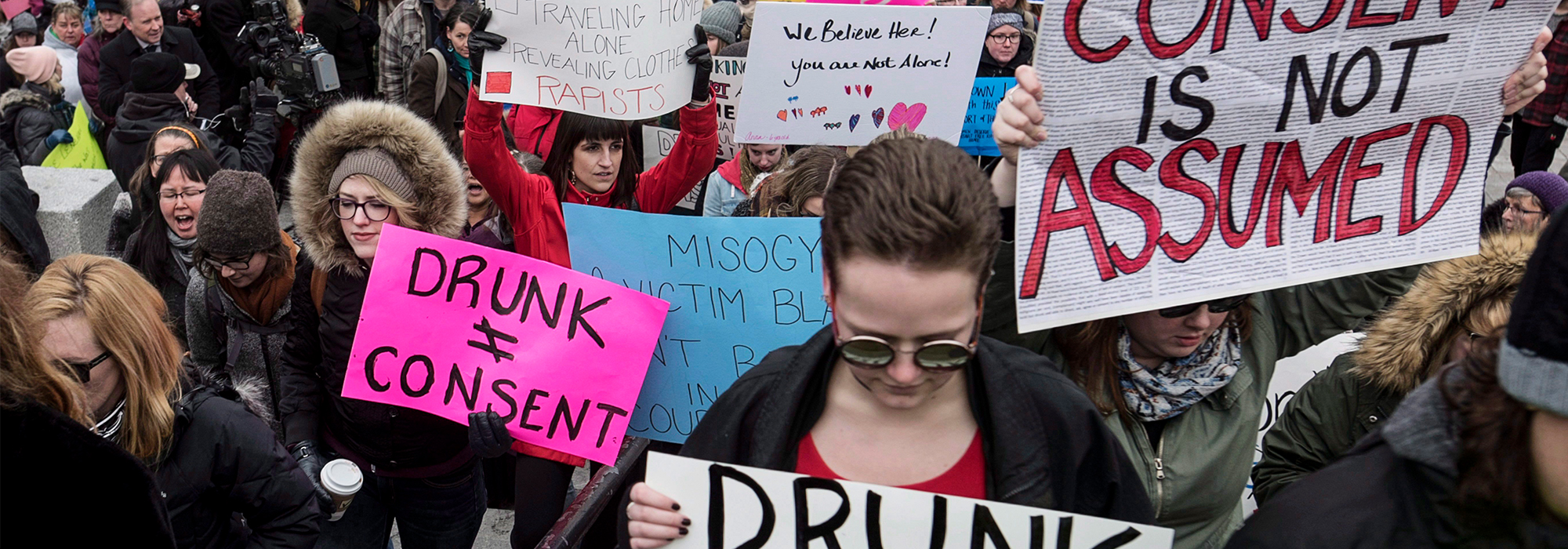
(This article has been translated into French.)
A bill studied and amended by the Senate and now back before the House of Commons would make significant changes to the law of sexual assault in the Criminal Code. But Bill C-51 contains one clause that has alarmed feminists, legal scholars and front-line anti-violence advocates across the country. It states that women cannot consent to sexual activity if they are (a) unconscious, or (b) otherwise incapable of consent. This provision runs the risk of setting the standard for incapacity at unconsciousness. It also fails to resolve widespread problems with how judges determine whether highly intoxicated women (who are not unconscious), and women with mental disabilities, have the capacity to consent. A proposed Senate amendment would address these critical flaws in the bill – the Liberal government should accept the change.
Make no mistake: our courts have consistently ruled that unconscious people cannot consent. But the changes in the bill would generate a new problem for sexual assault law, and therefore for women who report sexual violence, by implying that unconsciousness is the benchmark for incapacity. Defence counsel may argue, and judges may agree, that by specifying “unconsciousness” as a legislated form of incapacity to consent, Parliament intended unconsciousness to be the standard for incapacity.
Meanwhile, in Canada every year thousands of women are sexually assaulted while conscious but otherwise incapable of consenting, including women who are incapacitated by drugs or alcohol to a degree short of unconsciousness. Intoxicated women are disproportionately targeted for sexual assault precisely because perpetrators know that the women are less likely to be believed by police, judges and jurors. In those rare cases where charges are laid, convictions are particularly difficult to obtain, in part because judges lack clarity on the definition of incapacity and, as a result, tend to rely on evidence of consciousness as proof of capacity.
Take, for example, the Al-Rawi case, where a Nova Scotia trial court acquitted a taxi driver who sexually assaulted his severely intoxicated passenger in the back of his taxi cab. Despite the fact that the complainant was found by police in the cab, unconscious and undressed, with the accused between her legs, the trial judge ruled that, because the precise moment when the complainant lapsed into unconsciousness in the 11 minutes between when she entered the cab and when police intervened was unknown, she may have been capable of consenting.
This dangerous approach to capacity, which equates consciousness with the capacity to make a meaningful choice to engage in sexual activity with a complete stranger, risks making women who are severely intoxicated even more vulnerable to predatory sexual behaviour. The Nova Scotia Court of Appeal identified the trial judge’s reasoning as erroneous and sent Al-Rawi back for retrial, but without providing meaningful guidance on how incapacity short of unconsciousness is to be determined.
Unfortunately, the government’s proposed bill also neglects to address this persistent and widespread failure of our current law to identify criteria for the assessment of incapacity to consent. And intoxicated women are not the only ones who stand to lose. Women with mental disabilities, including women experiencing mental illness, developmental disability or dementia, are also disproportionately targeted for sexual violence. The focus on unconsciousness in Bill C-51 ignores this group of complainants altogether. Unconsciousness is a meaningless standard when dealing with mental disability.
The Senate, guided by the efforts of Senator Kim Pate, has responded to the uncertainty the proposed bill would generate and to the need to correct deficiencies in the current law. The proposed amendment would specifically direct judges to consider forms of incapacity short of unconsciousness. The Senate’s amendment provides that a complainant who lacks the capacity to appreciate the essential features of the sexual activity she is engaging in, who cannot appreciate the risks of the activity, who does not understand that she has the choice to engage in it or not, or whose communicative abilities preclude communication of consent or withdrawal of that consent cannot provide her “voluntary agreement.” An accused person who proceeds with sexual activity in the face of such conditions is engaged in predatory behaviour deserving of condemnation as sexual assault.
This government has repeatedly made much of its commitment to feminism. Yet it is poised to reject an amendment that is widely supported by feminist activists and academics across this country, as well as organizations tasked with providing services to victims of sexual violence. Instead, the government claims it intends only to “codify” existing law, and will leave it to the courts to resolve the remaining issues. Sadly, countless women and girls will pay the price of this inaction.
This piece is based on letters sent to the Prime Minister and the Minister of Justice by LEAF (the Women’s Legal Education and Action Fund) and the Barbra Schlifer Commemorative Clinic, and by 11 professors with sexual assault law expertise: Janine Benedet (UBC); Elaine Craig (Dalhousie); Blair Crew (University of Ottawa); Daphne Gilbert (University of Ottawa); Lise Gotell (University of Alberta); Isabel Grant (UBC); Jennifer Koshan (University of Calgary); Jennifer Quaid (University of Ottawa); Melanie Randall (Western University); Elizabeth Sheehy (University of Ottawa); David Tanovich (University of Windsor).
Photo: Demonstrators protest Judge Gregory Lenehan’s decision to acquit a Halifax taxi driver charged with sexual assault during a rally in Halifax on March 7, 2017. THE CANADIAN PRESS/Darren Calabrese
Do you have something to say about the article you just read? Be part of the Policy Options discussion, and send in your own submission. Here is a link on how to do it. | Souhaitez-vous réagir à cet article ? Joignez-vous aux débats d’Options politiques et soumettez-nous votre texte en suivant ces directives.











